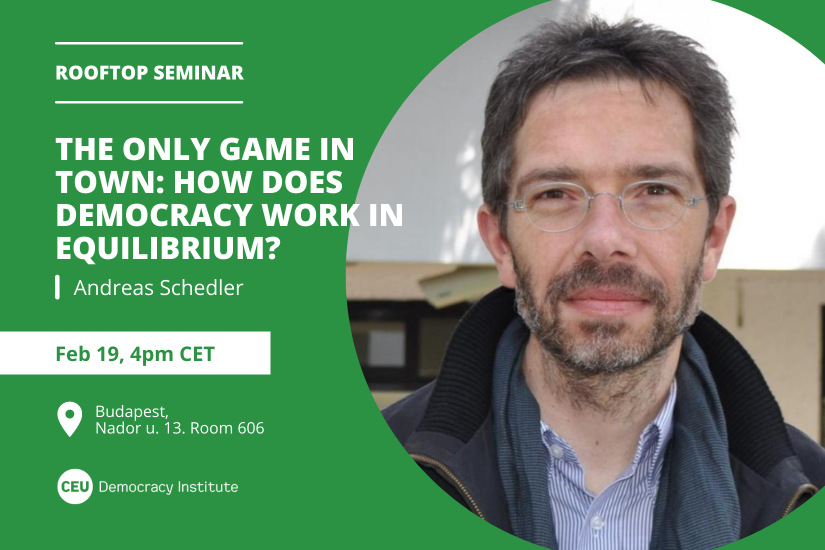
The De- and Re-Democratization (DRD) Workgroup of the CEU Democracy Institute cordially invites you to its next Rooftop Seminar. You can check our past events here.
If you would like to attend, please register here.
Please keep in mind that external guests cannot enter the building without prior registration. Due to space restrictions, attendance is limited. We ask registered visitors to pick up their temporary visiting card at the reception. The event is not open to the press.
Abstract:
By a common metaphor, democracy is in equilibrium when it has become “the only game in town,” where all political actors know, accept, and follow its ground rules and know that everyone else is doing so as well. While the metaphor captures well the “basic democratic trust” that reigns in stable democracies, it also paints an idealized, unattainable picture of “democratic normality.” It suggests a wider ideological consensus, more direct access to knowledge, fewer normative controversies, and a greater weight of material self-interest than democratic politics can afford. These four simplifications or “illusions” distort the way democratic politics operates in the real world. To gain a more realistic idea of democratic equilibria, we need to correct them. Unless we understand the nature of democratic equilibria, we will be unable to understand the nature of democratic crises.
The paper is available upon request from the author.
Speaker:
Andreas Schedler is a Senior Research Fellow at the CEU Democracy Institute. He is the Lead Researcher of the De/Re-Democratization Working Group and a Visiting Professor at CEU Vienna. He earned his PhD from the University of Vienna. Before joining the CEU, he was a professor of political science at the Center for Economic Teaching and Research (cide) in Mexico City. A leading comparative scholar of democracy, democratization, and authoritarianism, he has conducted research on democratic consolidation and transition, authoritarian elections, anti-political-establishment parties, political accountability, and organized violence. He is also known for his methodological work on concept analysis and cross-national measurement. His current research focuses on political polarization and the destruction of basic democratic trust.
Discussant:
Carsten Q. Schneider is Pro-Rector for External Relations and Professor of Political Science at Central European University (CEU) and MA Program Director of the Department of Political Science. His research and teaching interests focus on the study of political regime change processes in different world regions and on comparative social science methodology, especially set‐theoretic methods. He is author of The Consolidation of Democracy in Europe and Latin America, co‐author of Set‐Theoretic Methods for the Social Sciences, and of articles that appeared, among others, in Comparative Political Studies, Democratization, European Journal of Political Research, Political Analysis, Political Research Quarterly, and Sociological Methods and Research. Two books on set-theoretic methods are forthcoming in Cambridge University Press series ‘Methods for Social Inquiry’. Schneider is the winner of the 2019 David-Collier Mid-Career Achievement Award. From 2009-14, he was an elected member of the Germany Academy of Young Scientists.
Chair:
Anil Duman is Head of the Department of Political Science and Professor of Policital Science at Central European University (CEU) in Vienna. She has received her M.A. and Ph.D. in Economics from University of Massachusetts, Amherst. Her broad research interests include labor economics, political economy, industrial relations, welfare state policies, and redistribution. In her recent research, on the one hand, she has been specializing on the labor market effects and governance of informality, particularly on employment and wage consequences of a dual economic structure. On the other hand, she is examining the relationship between refugee influx and living and working conditions in the context of a developing country. Her previous research focuses on analysis of skill formation, skill distribution, and their relation to individual policy preferences across countries and over time. She is also involved in research projects examining the transformation of social protection regimes in several transition countries.